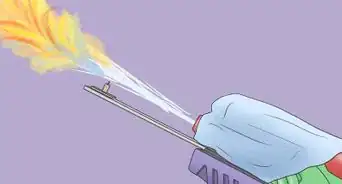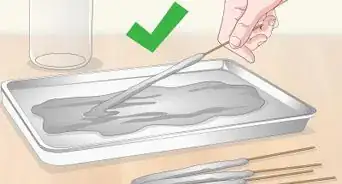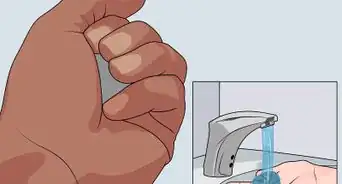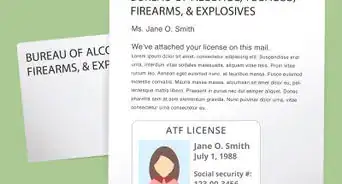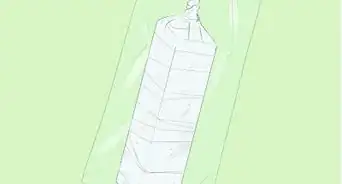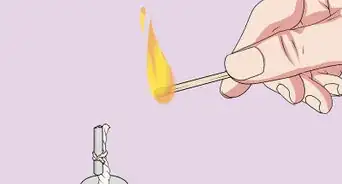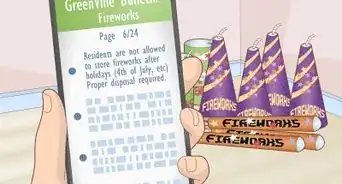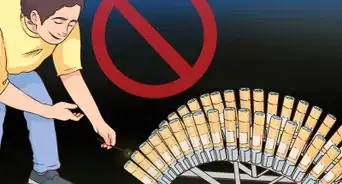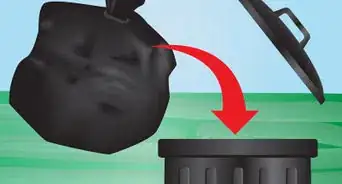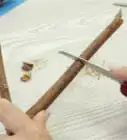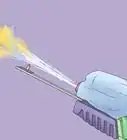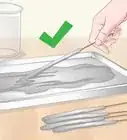wikiHow is a “wiki,” similar to Wikipedia, which means that many of our articles are co-written by multiple authors. To create this article, 40 people, some anonymous, worked to edit and improve it over time.
This article has been viewed 397,540 times.
Learn more...
Nothing says "celebration!" like the pyrotechnic displays brought to you courtesy of flash powder—the stuff that makes flares flare, fireworks explode, and other fun things that go BOOM. Flash powder is a rapidly-burning mixture of an oxidizer and a fuel—commonly potassium perchlorate and aluminum powder—and is guaranteed to light things up. Flash powder is seriously, rip-your-face-off hazardous, but it's fun to make... just be careful not to light yourself up in the process!
Steps
-
1Get a license. Contact the ATF online, and download their application to be a licensed fireworks maker.
- This will make sourcing and purchasing the ingredients much easier, as most U.S. businesses will not risk selling the ingredients, especially if they think you are using it to make a bomb. The liability for them is too great to risk it.
- This will make sourcing and purchasing the ingredients much easier, as most U.S. businesses will not risk selling the ingredients, especially if they think you are using it to make a bomb. The liability for them is too great to risk it.
-
2Acquire aluminum powder and potassium perchlorate. There are U.S. federal restrictions on these items.[1] For example, aluminum powder is limited to two pounds a year without a ATF High Explosives Manufacturing license, and a potassium perchlorate could get you investigated by the Fed and/or the Consumer Product Safety Commission. They mean business.
- Search for fireworks supply houses or hobby chemical retailers for sources
- It may be necessary to grind the aluminum powder in a strainer in order to work out the lumps.
- The powder must be 400-600 mesh (measure of how fine the powder is).
Advertisement - Search for fireworks supply houses or hobby chemical retailers for sources
-
3Treat your work area with an anti-static spray. You can purchase commercial anti-static sprays, or make your own from a 9:1 mixture of water and fabric softener.
-
Do not omit this step. A static discharge can ignite the powder, resulting in an explosion[2]
that could ruin your whole day, or your whole house, or send bits of you flying into the neighbor's yard.
- The correct ratio of potassium perchlorate to aluminum for any quantity of flash powder is 7:3.To make a 5g mix (perfectly suitable for a small bang), weigh out 3.5 grams (0.1 oz) of the potassium and 1.5 gram (0.05 oz) of the aluminum.ie a 7:3 mix
-
Do not omit this step. A static discharge can ignite the powder, resulting in an explosion[2]
that could ruin your whole day, or your whole house, or send bits of you flying into the neighbor's yard.
-
4Mix your ingredients. Do not stir, crush, press, or stand upon the mix. Though most flash powders are not impact sensitive, it is very easy to make a very, very unstable mixture.
- The best way to mix the powders together is to pour all of the chemicals into a ziploc bag, spray it with anti-static spray, and slowly mix the chemicals by shaking the bag. However, there is some debate as to the safety of this method, so if you do use it be sure to spray the bag with anti-static spray in order to reduce the chance injury.
- A common method for commercially prepared flash powders is to combine the two powders in a capped plastic bottle and roll it gently between your hands to mix the powders.
- The best way to mix the powders together is to pour all of the chemicals into a ziploc bag, spray it with anti-static spray, and slowly mix the chemicals by shaking the bag. However, there is some debate as to the safety of this method, so if you do use it be sure to spray the bag with anti-static spray in order to reduce the chance injury.
-
5Don't use a match when lighting it, use fuse to light the powder from a safe distance and enjoy the explosion.
Community Q&A
-
QuestionHow can I make fire in powder without matches or a lighter?
 Community AnswerUse electric fuse. It can be made from a copper wire, but the originals are cheap and need low voltage 1.5v +.
Community AnswerUse electric fuse. It can be made from a copper wire, but the originals are cheap and need low voltage 1.5v +. -
QuestionCould I use potassium nitrate instead of perchlorate?
 Community AnswerYes, but it's much weaker and requires a more solid cap end, so hot glue the ends etc., and be careful with hot glue ends pointing at someone or glass windows as they may fly off at a high rate of speed.
Community AnswerYes, but it's much weaker and requires a more solid cap end, so hot glue the ends etc., and be careful with hot glue ends pointing at someone or glass windows as they may fly off at a high rate of speed. -
QuestionIs this the flash powder that give photographers their light source?
 Community AnswerNowadays they use xenon flash bulbs. Originally they used magnesium powder.
Community AnswerNowadays they use xenon flash bulbs. Originally they used magnesium powder.
Warnings
Things You'll Need
- Potassium perchlorate
- Aluminum powder
- Anti-static spray
- Ziploc Bag
- Scale
Warnings
- Flash powder mixtures containing sulfur are unstable and may spontaneously combust. Do not use these.⧼thumbs_response⧽
- Always get your hands away from the ignition source or else you may get burned!⧼thumbs_response⧽
- Never compress a flash powder. When ignited, a compressed flash powder will explode.⧼thumbs_response⧽
- Never ignite indoors. The smoke and fumes are usually toxic and the fire will more than likely burn your house down. You will probably be blinded from the smoke and light and will more than likely fail to escape and burn to death. Did we mention it could ruin your day?⧼thumbs_response⧽
- Outdoors is always your best bet to avoid any mishaps when lighting the powder.⧼thumbs_response⧽
- Do not stare directly at the explosion, as it is extremely bright and may damage your eyes.⧼thumbs_response⧽
- Never ingest the chemicals. Some oxidants are genetically damaging. Others just kill you. Did we mention this was dangerous?⧼thumbs_response⧽
- Always wash your hands after handling chemicals.⧼thumbs_response⧽
- If you are inexperienced don't even attempt to make any pyrotechnics.⧼thumbs_response⧽
- This is illegal in Australia, the UK, the US and India without a license so do not try to make it as you may get caught and go to face legal consequences.⧼thumbs_response⧽
- Flash powder is volatile and can cause serious injury or death; it should be only produced and handled under the guidance of someone experienced in its use.⧼thumbs_response⧽
